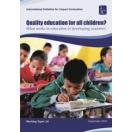
Quality education for all children? What works in education in developing countries
3ie Working Paper 20
In this working paper, Shari Krishnaratne, Howard White and Ella Carpenter analyse the evidence from 75 studies of a range of school interventions.
The paper shows that education interventions are not only getting more children into school and keeping them there but are also helping children to learn more. There is compelling evidence of the effectiveness of conditional cash transfers on school enrolment and attendance. Health interventions also had a significant, positive impact on school attendance. While the provision of new teaching materials had no impact on school attendance or language test scores, computer-assisted learning tools had significant, positive impacts on maths test scores. And providing better school buildings significantly improved maths, reading and writing test scores.
Quality education for all children? What works in education in developing countries is based on the 3ie-funded study by Anthony Petrosino and colleagues (2012) entitled Interventions in developing nations for improving primary and secondary enrolment of children, plus additional studies identified in a supplementary search. In the working paper, the authors present a new categorisation of supply-and demand-side interventions, drawing out lessons about the effectiveness of each intervention.
Key findings
- Conditional cash transfers increase school enrolment and attendance, but have no overall impact on children’s test scores (though the evidence base is not that broad for learning outcomes).
- School fees subsidies improve enrolment and progress in school, while merit-based scholarships increase learning.
- Distributing teaching and learning aids in school has no impact on school attendance and language test scores of children. However, computer-based learning offered in addition to the regular school curriculum has positive impacts on mathematics test scores.
- Investing in additional teachers, new schools, early childhood development programmes, community-based school management and school-feeding programmes looks promising in boosting schooling outcomes.




